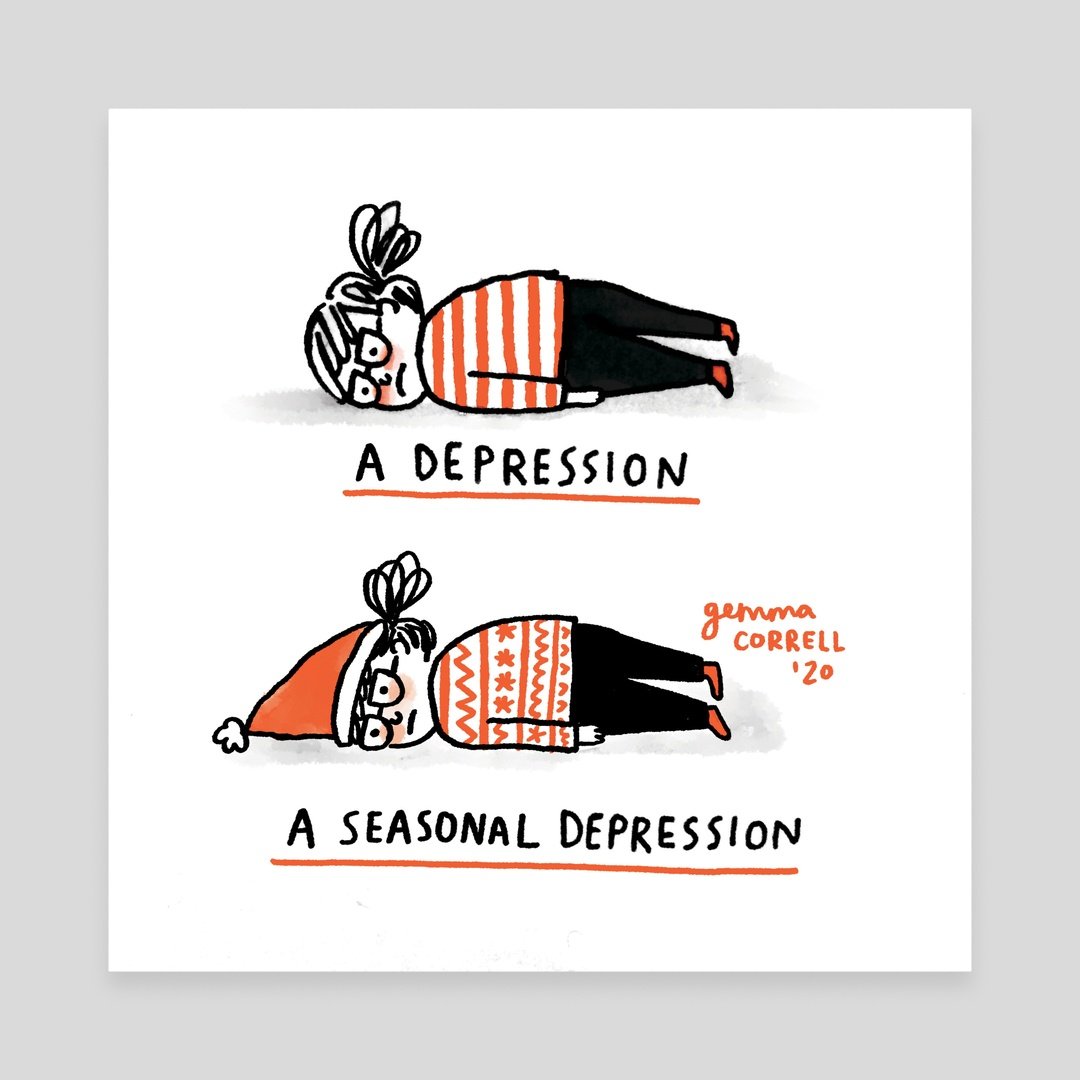Beat the Winter Blues (with support)
Image Credit: Gemma Correll
Coming soon to Empowered Life Counseling: Beat the Winter Blues with a Self-Compassion Support Group! Support groups foster connection and a focus on coping skills by being member-led and directed. I am currently running a survey for current or prior clients to share their interest and availability for a self-compassion support group. Many folks have shared their loathing for the end of daylight savings time; concerns about the stress of the upcoming holidays; and feelings of general discontent around this time of year. It’s time to support each other with compassion!
What are we going to talk about?
We’re gathering around the common stressors of feeling down this time of year and holiday stress; some folks call it “seasonal depression,” while others just recognize this year is a “shit show.” We also have a common need of compassion, both for ourselves and each other. So we’ll discuss all of this, first by getting to know each other and building connection. Sound awkward? I hope so! Brene Brown advised us to “Stay awkward, brave, and kind” to cope through the pandemic because that vulnerability brings us together; fear and isolation drive us away from others. As we show up for each other, we’ll learn about self-compassion so we can show up for ourselves. We’ll share some of the problems that are coming up and brainstorm how to cope; we’ll share from our perspectives what works for us; we’ll learn about the different categories of coping and how to get the most “bang for our buck.” We’ll talk specifically about:
seasonal factors contributing to stress, including family holiday expectations; reduced daylight hours and weather limiting time outdoors; winter fatigue and low energy;
the difference between seasonal stress/burnout, depression and Seasonal Affective Disorder, and when to see the doctor;
empirically-supported methods of coping, including self-compassion practices and learning about our body’s reaction to stress to work with it rather than against it;
review myths and misconceptions about seasonal stressors, while supporting each other!
What do I need to know about gathering in a group setting?
There are multiple types of groups. A support group is member-led and has a focus on general coping skills, or focused on a specific topic, and can meet for a short- or long-term. Group therapy is facilitated by a licensed therapist with a focus on change and processing stressors, typically related to mental health, and can usually be longer-term. Groups can be open or closed; open groups allow participants to join or stop attending at any point during the group cycle. Closed groups ask anyone interested to join at the start of the group cycle and do not allow new group members after the group has started meeting. Groups generally have 8-10 individuals present and can meet virtually or in-person. At the first group, group norms are discussed and the group comes to an agreement on basic “ground rules” for everyone to abide by, including surrounding confidentiality.
So what type of group will this be?
This group will likely be an open support group that meets weekly or biweekly for 90-ish minutes, with the setting (virtual, in-person or hybrid) to be determined based on individual feedback. Winter weather, upcoming holidays and Covid/flu contagion will be considerations for this as well (y’know, all the reasons this group is needed). It will be member-led and I will simply facilitate, providing structure and routine with each group meeting and possibly guiding the conversation as needed.
Ready to learn more about coping with the winter blues and cultivating self-compassion in your own life?
Contact Kara to schedule an appointment! Don’t hesitate to call or email now!
-
APA: Understanding Group Therapy
Support Groups: What to Expect
NIMH Seasonal Affective Disorder
How to Fight Seasonal Depression Amidst the Pandemic
Neff, Kristin. Self-compassion: Stop Beating Yourself Up and Leave Insecurity Behind. New York: William Morrow, 2011.
Neff, Kristin, and Christopher K. Germer. The Mindful Self-Compassion Workbook: A Proven Way to Accept Yourself, Build Inner Strength, and Thrive. , 2018. Print.
Self-Compassion Self-Help Resources - Information Sheets & Workbooks (health.wa.gov.au)
Fierce Self-Compassion: A Conversation With Kristin Neff | Psychology Today



